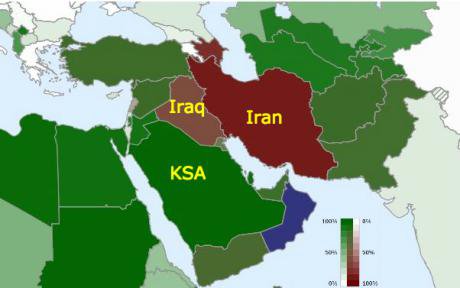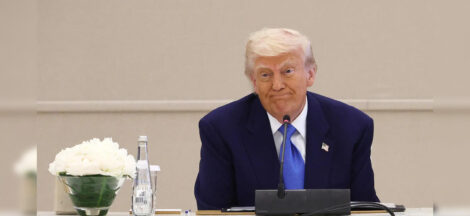It may be wrong to believe that Israel and the United States of America are the only two countries strongly against Iran’s bid to become a nuclear-armed country. The entire world is concerned about nuclear proliferation and nuclear smuggling and its falling into the wrong hands. The nature of the Iranian regime has added to the concern. It is probably the only major country in the world run directly under a spiritual leader. This may be the cause of worries for many. The Vatican City state of Rome, a Papal Kingdom, retains only a small ceremonial unit of the Swiss Guard as its defence force, which also serves as the Pope’s personal body guard. The Pope generally preaches love, compassion and world peace.
Iran is ruled by the supreme Shia spiritual cleric, Ayatollah Ali Khamenei, championing the cause of Shia supremacy. Shiite Iran is believed to be aspiring to build a nuclear arsenal ever since Sunni Islamic faction led Pakistan became a nuclear-armed state. Iran is an Islamic republic with a strong theocratic system and a great influencer of Shiite states and Shiites across the world. In contrast, the present Grand Imam of Al-Azhar, Ahmed el-Tayeb, considered to be the highest authority in Sunni Islamic thought and jurisprudence, is not known to be a political person.
Although only three countries across the Muslim world, comprising 57 states (members of the Organization of Islamic Cooperation), have a majority Shia population, the community has significant presence in several other Muslim countries mostly led by the rival Sunni faction. The Shia-Sunni rivalry makes Iran’s ambition to emerge as a nuclear-armed state a major geopolitical concern, especially in West and Central Asia as also in South and South-East Asia and European countries with a good Muslim population. The three Shia majority countries are: Iran, Iraq and Azerbaijan. Significant Shia communities also live in Bahrain, Lebanon, Kuwait, Turkey, Yemen, Saudi Arabia, Afghanistan and the Indian subcontinent.
Sunni community-led Pakistan’s nuclear arsenal has always been a major concern of western democracies as well as India. The late Abdul Qadeer Khan, the “father of Pakistan’s nuclear bomb,” was known for his involvement in smuggling of nuclear technology. He had officially admitted that he was running a nuclear proliferation network. He was initially placed under house arrest in 2004 after admitting to selling nuclear technology to Iran, Libya, and North Korea. A Q Khan was subsequently released in 2009. Most of the existing nuclear states fear that Iran might share nuclear weapons and technology with other countries or non-state actors, including terrorist groups, leading to wider proliferation.
The nature of Iran’s government headed by the supreme Shia spiritual leader and its ambition to emerge as a major nuclear power are what the non-Islamic world are mostly concerned about. The tiny Jewish state of Israel is highly worried as ‘annihilation’ of Israel is said to be the primary agenda of the supreme Iranian clergy. The western world is concerned as Iran’s devastating weapons such as long-range missiles and drones are in the hands of a spiritual cleric. Iran is believed to have the largest and most diverse ballistic missile stockpile in West Asia. Iran is displaying its military strike capabilities as the country’s spiritual head and supreme leader vowed to open “the gates of hell”. Through the best part of last week, waves of Iranian missile and drone barrages had been lighting up the skies across the tiny Jewish state of Israel which is only 1.33 percent geographical size of Iran. Israel’s total population is around 9.8 million as against Iran’s 87 million.
Under Iran’s supreme spiritual leader, the country has been developing sophisticated long-range missiles for decades. From the very beginning, the oil-rich “spiritual fiefdom” wanted to be a strong military power and be seen as the biggest strength of the global Shia community, constituting nearly 15 percent of the global Muslim population of 2.047 billion as estimated by TimesPrayer.com. Islam is the world’s second-largest religion in terms of adherents. The Muslim population has been growing faster than the overall world population, with a 21 percent increase in the number of Muslims between 2010 and 2020, compared to a 10 percent increase for the rest of the world.
Today, Iran possesses a very large number of short-range rockets and potential hypersonic weapons, most of which are locally produced with the blessings of the Ayatollah. Estimates from the US Office of the Director of National Intelligence suggest that Iran possesses around 3,000 ballistic missiles, a figure that surpasses any other regional power, according to the Australian Broadcasting Corporation. They include missiles of various ranges and types, contributing to Iran’s significant military might in the region.
Iran has also emerged as a major manufacturer-exporter of highly sophisticated drones. Last year, the Ukraine government claimed that Russia launched over 8,000 Iran-developed drones during the war. Iran is recognized for its advancements in drone technology, particularly in areas like combat drones and loitering munitions (suicide drones). Iran has been exporting drone technology to various countries, including Sudan, Syria, and Ukraine, and has supplied drones to regional allies and militias.
To the credit of the country’s spiritual leadership, Iran has developed a massive drone industry. It has been relying on indigenous production helped by international sanctions. Iran’s drone industry has focused on local engineering and manufacturing. It has been producing drones like the Ababil, Mohajer, and Shahed series, including the Shahed-136 (also known as Geran-2 in Russia) and the newer Shahed 238. Iran’s Kaman-22 drone resembles the US MQ-9 Reaper. Iranian drones are reshaping the dynamics of conflicts, particularly in West Asia and in the Russia-Ukraine war context.
With Pakistan boasting the Sunni nuke, Iran’s development of Shia nuke arsenal could be only a matter of time. The US-led western world and the Jewish state of Israel are most unlikely to be able to halt the process. In a normal situation, the western world and even Israel, the world’s eighth largest nuclear power, would not have been so hyper about Iran’s nuclear ambition if its purpose were purely in self-defence.
However, under the supreme spiritual leader Ayatollah, Iran is often seen as a “rogue state” by many Western countries, particularly the US, largely due to Iran’s challenging of the US-led world order and its support for groups that oppose American interests in the West Asian region. Iran is known to actively support groups like Hezbollah and Hamas, which are considered terrorist organizations by the US and its allies. Oil-rich Iran turning to be a major nuclear armed state is seen as a major threat to the existing balance of power. The control of the state machinery in the hands of a supreme spiritual leader adds to the cause of worry. (IPA Service)



